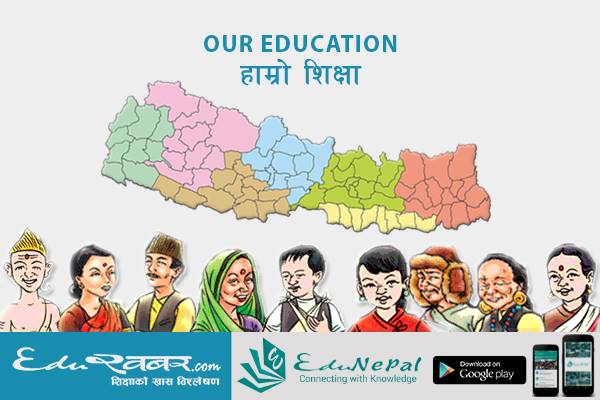
Bhaktapur - A good classroom and achievement in learning is crucial for educational reform in Nepal. The power and responsibility allocated by state to different institutions will be meaningless until student centric teaching methods are practised in schools. With local bodies receiving more power in the new constitution for operating schools, there are both challenges and opportunities. What do the relevant stakeholders of Bhaktapur municipality recommend for improving quality education in public schools? A report :
With newly elected representatives taking up their new roles in Bhaktapur Muncipality, Ambika Nyaichai, the Principal of Bashu Secondary School is optimistic about better quality of education.
She says the decision to transfer all powers regarding the operation of secondary education to local bodies is a positive step and it can help resolve many education related problems.
She argues that the local representatives should increase monitoring of schools to ensure quality education. She also urges them to look into the student teachers' ratio of each school and make the necessary arrangements.
'The elected representatives should understand the status of teachers and improve the quality of education in order to tackle challenges that the growing number of private schools have created in the communities,' she said adding that teacher's should be made more accountable and resourceful through training and skill development opportunities.
However meeting that expectation is an uphill task. According to Bishow Bahadur Duwal, a teacher in the same school, there are many challenges. 'The elected representatives have said in their slogans that they would take the quality of education in community schools equivalent to that of the private schools. However, we are yet to see their blueprints,' he adds.
In the past, Bhaktapur Municipality had announced free education till grade seven in however the decision was revoked after it failed badly.
'We should look into the lessons we have learnt and focus on imparting technical skills to the students. While investing for expansion of education, we should pay special attention to ensure that we are not producing disqualified citizens.'
Roshanraj Tuituin, the principal of Sharada High School says with the shift in power teachers can now adopt research based methodologies. He said teachers who teach large number of students should get better salaries compared to teachers who look after classrooms with a very number of pupils.
Sajarni Joshi, the Principal of Bidhyarthi Niketan High School says school reforms should take place from the very lower level. 'We should create good infrastructures for the early childhood development and make a step by step plan. The challenge of the elected representatives is to restore the faith on the quality of education in public schools.'
Some other practitioners stress the need of better policy so that the schools can focus on teaching technical subjects to students from lower grades. 'If we invest in technical education, we can address the problem of unemployment and meet the demands of the market,' says Dinesh Pradhan, a teacher of the Baghishwori High School.
Experts say that a good classroom and achievement in learning are crucial for educational reform in Nepal.
They argue that power and responsibility allocated by state to different institutions will be meaningless until student centric teaching methods are practised in schools.
Students on the other hand want regular classes and conducive learning atmosphere.
With local bodies receiving more power in the new constitution for operating schools, there are both challenges and opportunities. 'Some schools in Bhaktapur are still suffering from strike and political protests, the municipality should accord top priority to prevent such activities. They should also focus on reconstruction of schools damaged by the earthquake two years ago.'
Meanwhile, representatives of local bodies have begun announcing their educational policies and plans after assuming their responsibility. While some local bodies are still struggling to focus on their educational goals, Bhaktapur, which has an experience of operating and managing Khwopa College, wants to be an example, according to newly elected representatives.
Rabindra Jyakhwo, the chairperson of ward number 9 of the municipality, says the municipality would abide by the recommendations from teachers, students and school management committees.
He says, 'Schools are still under the district education office. We are yet to officially assume our role regarding the management of schools. We will first identify the needs of each school and discuss about their problems with the relevant stakeholders to find a solution.'
Jyakhwo, who is also a member of the management committee of the Khwopa College, says the municipality was working to allocate special budgets for operation and management of the schools.
(This stories the part of a radio programme entitled 'Hamro Sikshya' which discusses the opportunities and challenges in public education in the new federal setup. The programme is produced by edukhabar.com with the support of Action Aid Nepal. It is aired from Radio Dhangadhi, Kailali, Radio Doti based in Doti and Radio Taha Sanchar based in Kathmandu. The radio programme can also be tuned through this link: Hamro Sikshya and also through aneroid app Edunepal.)
प्रतिक्रिया